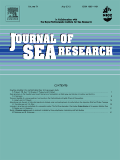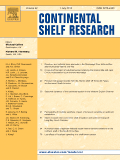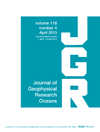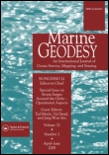
OCEANOLOGY
Scope & Guideline
Unveiling Insights Beneath the Waves
Introduction
Aims and Scopes
- Marine Ecosystems and Biodiversity:
Research on the diversity, distribution, and ecological dynamics of marine organisms, including studies on phytoplankton, zooplankton, and benthic communities, emphasizing their roles in marine food webs and ecosystem health. - Geological and Geophysical Oceanography:
Investigations into the geological structures, sedimentology, and geophysical properties of ocean basins, including studies on tectonics, sediment transport, and the impact of geological processes on marine environments. - Hydrochemistry and Biogeochemistry:
Studies that assess the chemical composition of seawater, sediment, and biogenic materials, focusing on nutrient cycling, organic matter dynamics, and the impact of anthropogenic activities on marine chemistry. - Physical Oceanography and Climate Impact:
Research on oceanic physical processes, including currents, waves, and thermal dynamics, and their interactions with climate change, particularly in polar and temperate regions. - Marine Pollution and Environmental Monitoring:
Investigative studies on the sources and impacts of marine pollution, including heavy metals, hydrocarbons, and microplastics, along with methodologies for monitoring environmental changes. - Innovative Research Methodologies:
Development and application of cutting-edge technologies and methods, such as remote sensing, autonomous underwater vehicles, and advanced modeling techniques, for comprehensive oceanographic research.
Trending and Emerging
- Climate Change Impact Assessments:
There is an increasing emphasis on studying the effects of climate change on marine ecosystems, including shifts in species distributions, altered oceanographic conditions, and changes in primary productivity. - Technological Innovations in Ocean Research:
The use of advanced technologies, such as autonomous vehicles and remote sensing techniques, is becoming more prevalent, reflecting a trend towards innovative methodologies for data collection and analysis in oceanography. - Microplastics and Marine Pollution Studies:
Research focused on the prevalence, impacts, and mitigation strategies for microplastics in marine environments is gaining traction, highlighting the growing concern over marine pollution and its ecological consequences. - Ecosystem Services and Management Approaches:
An emerging focus on understanding and managing ecosystem services provided by marine environments, including carbon sequestration, biodiversity conservation, and sustainable fisheries management. - Dynamic Interactions in Marine Food Webs:
Increased attention is being paid to the complex interactions within marine food webs, particularly regarding how climate change and human activities affect these relationships and ecosystem stability.
Declining or Waning
- Traditional Marine Resource Exploitation Studies:
Research focusing on the historical exploitation of marine resources, such as fisheries, has decreased. This may indicate a shift towards more sustainable practices and a focus on ecosystem-based management rather than resource extraction. - Historical Climate Studies:
While climate studies remain important, there has been a noticeable decline in papers centered around historical climate patterns, suggesting a move towards contemporary climate change impacts and predictive modeling. - Invasive Species Research:
Although the impacts of invasive species are still relevant, the frequency of studies specifically targeting invasive species dynamics in marine ecosystems appears to be waning, possibly due to a shift in focus to broader ecological interactions.
Similar Journals

Journal of Oceanology and Limnology
Bridging Disciplines for a Healthier PlanetJournal of Oceanology and Limnology, published by SCIENCE PRESS, is a premier academic journal dedicated to advancing the fields of oceanography and limnology. With an ISSN of 2096-5508 and E-ISSN 2523-3521, this journal has emerged as a vital resource since its inception, aiming to disseminate cutting-edge research and comprehensive studies on aquatic environments. Based in China and indexed with notable rankings in Scopus, including a Q2 category in Oceanography and a Q3 category in Water Science and Technology, this journal significantly contributes to knowledge in these crucial scientific disciplines. The H-index for the journal is currently being established, reflecting its evolving impact within the academic community. Moreover, the open access model promotes wider dissemination, ensuring that research findings are accessible to a global audience. Covering a diverse range of topics from ecosystem health to climate impact on water bodies, the Journal of Oceanology and Limnology aspires to foster interdisciplinary dialogue and innovation among researchers, professionals, and students engaged in understanding and preserving aquatic life.

JOURNAL OF SEA RESEARCH
Empowering Researchers to Shape Marine UnderstandingJOURNAL OF SEA RESEARCH, published by Elsevier, is a premier academic journal dedicated to advancing knowledge in the fields of aquatic science, ecology, and oceanography. Since its inception in 1996, this journal has provided a vital platform for researchers and professionals to disseminate groundbreaking findings and promote fostering interdisciplinary discussions. With its impressive Q2 ranking in multiple categories, including Aquatic Science and Ecology, Evolution, Behavior and Systematics, it positions itself as a significant contributor to marine and environmental studies. The journal is accessible in both print (ISSN: 1385-1101) and online formats (E-ISSN: 1873-1414), ensuring wide reach and engagement within the scholarly community. Researchers and students alike will find the journal not only a reliable source of information but also a source of inspiration for future explorations. With a commitment to quality and a broad scope that spans fundamental to applied research, JOURNAL OF SEA RESEARCH remains an indispensable resource for understanding the complexities of marine environments and their relevance to our changing world.

REVISTA DE BIOLOGIA MARINA Y OCEANOGRAFIA
Exploring the Depths of Marine KnowledgeREVISTA DE BIOLOGIA MARINA Y OCEANOGRAFIA is a prominent academic journal dedicated to the fields of marine biology and oceanography, published by the Faculty of Marine Sciences and Natural Resources at Universidad de Valparaíso, Chile. Since its inception in 1996, this journal has been a vital platform for disseminating research findings and advancements in aquatic sciences, covering a breadth of topics relevant to the marine environment. With its current impact positioned within the Q4 quartile of both Aquatic Science and Oceanography categories in 2023, the journal serves as an essential resource for scholars, practitioners, and students alike, aiming to enhance their understanding of marine ecosystems. While the journal does not provide open access options, it continues to contribute valuable insights, helping to foster a deeper appreciation for oceanographic science and marine biodiversity. Located in the scenic city of Viña del Mar, Chile, this publication invites manuscripts that push the boundaries of knowledge and stimulate discourse within the marine sciences community, thereby promoting sustainable management and conservation of oceanic resources.

Jurnal Ilmu dan Teknologi Kelautan Tropis
Exploring innovative solutions for tropical ocean challenges.Jurnal Ilmu dan Teknologi Kelautan Tropis (ISSN: 2087-9423, E-ISSN: 2085-6695) is a premier scientific journal published by the Indonesian Oceanologists Association in collaboration with the Bogor Agricultural University, specifically from the Department of Marine Science and Technology. This journal is committed to advancing the field of tropical marine science, publishing high-quality research that addresses pressing issues in oceanography, marine ecosystems, and sustainable practices in tropical regions. By facilitating open access to valuable scientific knowledge, Jurnal Ilmu dan Teknologi Kelautan Tropis aims to engage researchers, professionals, and students alike, fostering collaboration and innovation in marine research. Located in the picturesque region of Bogor, West Java, Indonesia, this journal serves as a vital platform for disseminating findings that contribute to the conservation and effective management of tropical marine resources.

Oceans-Switzerland
Navigating the Waters of Scientific DiscoveryOceans-Switzerland, published by MDPI, is an esteemed open-access journal established in 2020, with a focus on providing a platform for the dissemination of high-quality research in the fields of Environmental Science and Oceanography. Based in the picturesque city of Basel, Switzerland, the journal seeks to foster a deeper understanding of oceanic processes and their implications for the environment through rigorous peer-reviewed articles. With an impact factor reflected in its 2023 Scopus rankings, placing it in the 56th percentile across its categories, Oceans-Switzerland continues to promote interdisciplinary collaboration and innovation, targeting a wide audience of researchers, professionals, and students keen on exploring the complexities of ocean systems. The journal's commitment to open-access policy ensures that groundbreaking research is available to a global audience, reinforcing its crucial role in advancing knowledge and shaping practices within the scientific community.

CONTINENTAL SHELF RESEARCH
Connecting Geology and Aquatic Science for a Sustainable FutureCONTINENTAL SHELF RESEARCH, published by PERGAMON-ELSEVIER SCIENCE LTD, is an esteemed journal within the fields of Aquatic Science, Geology, and Oceanography, reflecting a compelling intersection of these disciplines. Since its inception in 1982, this journal has served as a premier platform for disseminating cutting-edge research relevant to the continental shelf ecosystem, including its geological features, biological resources, and physical processes. With a Category Quartile ranking of Q1 in Aquatic Science and prominent Q2 standings in Geology and Oceanography, it is recognized for its rigorous peer-review standards and impactful contributions, evidenced by its respective rankings in Scopus. Researchers and professionals are encouraged to engage with the journal's array of high-quality articles that not only enhance scientific understanding but also inform policy and conservation efforts. This dedication to advancing knowledge makes CONTINENTAL SHELF RESEARCH an essential resource for those passionate about marine and coastal studies in the United Kingdom and globally.

JOURNAL OF GEOPHYSICAL RESEARCH-OCEANS
Exploring the Depths of Oceanic DiscoveryJournal of Geophysical Research-Oceans is a premier interdisciplinary journal published by the American Geophysical Union, focused on the dynamic field of ocean sciences. With a rich history dating back to 1986, this journal has become a pivotal platform for researchers, providing a wealth of data and innovative insights into oceanographic processes and their essential role within the Earth's system. The journal enjoys an impressive impact factor and consistently ranks in the Q1 quartile across numerous categories, including Earth and Planetary Sciences and Oceanography, making it a respected source for cutting-edge research and reviews. Notably, it holds significant positions within Scopus rankings, further emphasizing its importance in shaping the scientific discourse surrounding oceanic phenomena. While available through subscription, the Journal of Geophysical Research-Oceans remains an invaluable resource for academics, industry professionals, and students eager to deepen their understanding of ocean dynamics and geophysical interactions.

MARINE GEODESY
Navigating the Intersection of Oceanography and Geospatial ScienceMARINE GEODESY, an esteemed journal published by Taylor & Francis Inc, delves into the intricate field of oceanography, aiming to contribute profoundly to the understanding of marine spatial dynamics and geophysical processes. With an ISSN of 0149-0419 and an E-ISSN of 1521-060X, this journal has a commendable standing, currently classified in the 2023 Q2 quartile, reflecting its influential presence in the realm of Earth and Planetary Sciences, particularly oceanography, where it ranks 49th out of 145 journals. Since its inception in 1977 and its ongoing publication until 2024, MARINE GEODESY has been dedicated to disseminating groundbreaking research, case studies, and reviews that are crucial for scholars, professionals, and students engaged in the exploration of marine environments. While currently not an open-access journal, it nevertheless offers vital insights into marine geospatial analytics and geodesy, augmenting the knowledge base necessary for tackling contemporary challenges in marine science and geography.

Journal of Ocean University of China
Elevating Marine Studies through Quality ResearchThe Journal of Ocean University of China, ISSN 1672-5182, is a premier academic journal dedicated to advancing the fields of Ocean Engineering and Oceanography. Published by the esteemed Ocean University of China, the journal serves as a vital platform for researchers, professionals, and students to disseminate groundbreaking findings and foster collaboration in marine science and engineering. With a commitment to quality, the journal currently holds a Q3 ranking in both Ocean Engineering and Oceanography as of 2023, indicating its significant contributions within the scientific community. The journal's scope encompasses a wide range of topics including marine technology, ecological studies, and coastal management, all aimed at enhancing the understanding and utilization of oceanic resources. Although currently not Open Access, it continues to attract submissions from renowned scholars, ensuring a diverse and innovative range of research. By providing access to cutting-edge research and practical insights, the Journal of Ocean University of China plays a critical role in shaping the future of ocean sciences and engineering.

Indian Journal of Geo-Marine Sciences
Exploring the Depths of Marine KnowledgeThe Indian Journal of Geo-Marine Sciences, published by the NATIONAL INSTITUTE OF SCIENCE COMMUNICATION & INFORMATICS (NISCAIR), serves as a vital platform dedicated to the dissemination and advancement of knowledge in the field of marine and geosciences. As an open-access journal, it allows for improved visibility and accessibility of research findings to a global audience, enabling researchers, professionals, and students to share insights into oceanography and related disciplines. With a publication history spanning from 2007 to 2010 and continuing from 2012 to 2024, it has established itself within the academic community as a reliable source of innovative research, despite being classified in Q4 of Oceanography and holding a Scopus rank that places it in the 27th percentile. This journal is particularly relevant for those investigating marine ecosystems, geological oceanography, and their interconnections, thus playing an essential role in fostering understanding and communication within this important area of scientific inquiry.